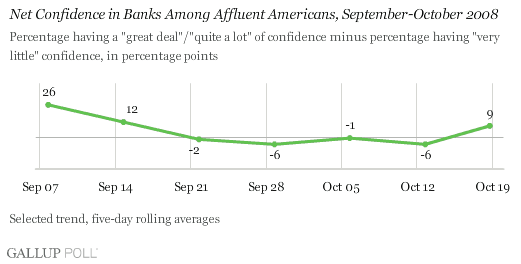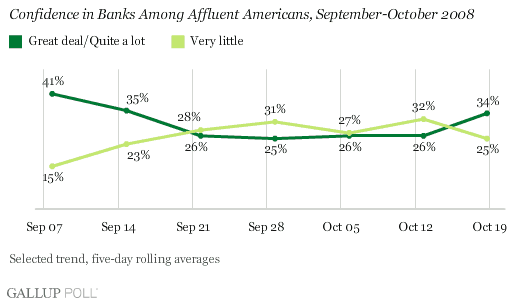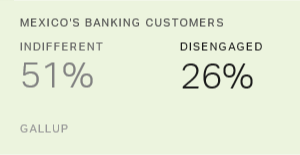PRINCETON, NJ -- Early in September, affluent Americans -- those having $100,000 or more in investable assets -- were more likely to have "a great deal" or "quite a lot" of confidence in U.S. banks (41%) rather than "very little" (15%), for a gap of +26 percentage points. By the end of the month, the gap had become -6 points. It remained mostly in negative territory during the first half of October, but has since improved significantly, and now stands at +9 points.

Affluent Americans' Confidence in Banks Improving
Normally, Gallup's annual survey of Americans' confidence in U.S. institutions shows confidence in banking to be strong and consistently so over time. However, this June's survey results were an exception as the public's confidence in banking plunged to a near-record low after the Bear Stearns bailout. Still, it wasn't until September that the decline in banking confidence began to reach crisis proportions among affluent Americans -- those having $100,000 or more in investable assets.
As of Sept. 8, as the federal government was taking over Fannie Mae and Freddie Mac -- the nation's two largest government-sponsored enterprises (GSEs) -- 41% of affluent Americans were saying they had "a great deal" or "quite a lot" of confidence in U.S. banks, while only 15% were saying they had "very little." Even as Lehman Brothers failed a week later and the government bailed out AIG, 35% had confidence in the nation's banks while only 23% had very little. However, once the Treasury began discussing its bailout proposal, confidence deteriorated.
The crisis of confidence in banking actually got worse toward the end of September as Congress considered the bailout proposal and the House failed on its initial effort to pass new legislation. The House finally passed the Treasury rescue legislation and the president signed it on Oct. 3. As these events were unfolding, 31% of affluent Americans said they had very little confidence in banking, while only 25% said they had a great deal/quite a lot of confidence.
At first, it appeared that the Treasury bailout and the increase in federal deposit insurance was working, as affluent Americans became a little more confident in the days after the passage of the new federal legislation. However, Wall Street took a record plunge over the next week as investors recognized that the financial crisis had done significant damage to the basic economy. As a result, confidence in banking remained weak.
In mid-October, things changed as governments around the world began to act to strengthen the global financial system and the Treasury announced it would inject new capital directly into U.S. banks. The Dow surged nearly 1,000 points on Oct. 13. Although the equity markets remained volatile over the following week, there were signs that the credit markets were beginning to improve. Most importantly, there were also signs that confidence in the U.S. banks had improved. By Oct. 19, 34% of affluent Americans were saying they had confidence in banks, compared with only 25% with very little confidence.

Commentary
Even as the equity markets remain weak and volatile, savers and investors can take some solace in the way governments around the world have acted to stabilize the global banking system and guarantee banking deposits. Confidence in the banking system is essential if the U.S. economy is going to continue to function efficiently.
The focus now appears to be shifting from the fragility of the global banking system to the fallout not only on Main Street, U.S.A., but also around the world. Recognition is now dawning that the United States is experiencing a severe recession that not only may not be significantly mitigated, but instead may be exacerbated by the performance of economies around the world.
As this shift takes place, behavioral economics suggests that the equity markets may have a period of irrationality as investors seek to adjust the value of their holdings relative to their revised perceptions of the real economy. Further, this irrationality is likely to be exaggerated by the needs of special investors like the hedge funds.
While none of this is good news for the banking system or the real economy, it is significant that the historic efforts to stabilize the global financial system have already taken place. As a result, the impact on the Main Street of the current deleveraging process may be mitigated, at least to some degree, as confidence in banking rebuilds over the weeks and months ahead.
Survey Methods
Gallup is interviewing affluent Americans nightly as part of one of its proprietary banking studies. Results are based on random interviews conducted with affluent national adults, aged 18 and older, having $100,000 or more of investable assets, conducted between Sept. 3 and Oct. 19, 2008. For results based on these 5-day rolling samples ranging from a low of 204 affluent adults to a high of 1,423 affluent adults, the maximum margin of sampling error ranges from ±3 percentage points to ±8 percentage points.
In addition to sampling error, question wording and practical difficulties in conducting surveys can introduce error or bias into the findings of public opinion polls.

